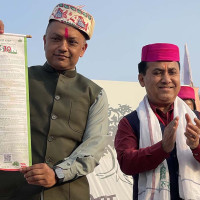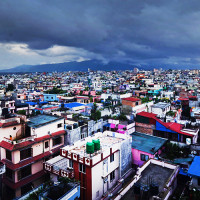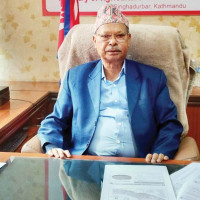- Thursday, 19 February 2026
Ownership Of Social Contract Builds Trust
The constitution of Nepal, promulgated in 2015, is often cited as a national social contract. It is a negotiated national document among Nepali political parties. Nepalis have expressed their views, interests and rights to the elected members of the Constituent Assembly who drafted it. It has set the obligations of people, the state and a raft of institutions of governance. As Nepali society has shifted from duty-based inherited bonds to self-chosen rights-based, the social contract has become necessary at the various scales of life, from marriage, labour-capital relations and political parties-followers ties to citizens and the state.
The ubiquity of contractual tradition in every sphere of Nepali life defends civic elements of laws, science, reason and progressive social change to abolish social vices, prejudice and customary traits restrictive of people’s freedom, equality and dignity. The contractual legal tradition is incompatible with fatalism, reductionism and social deprivation. The social contract also puffs the faith-based system, ubiquity of corruption in political life and impunity for higher authorities. The reality tests defy them. Higher productivity of Nepalis depends on the use of apt knowledge, technology, innovation and capital investments in productive sectors of the political economy to sustain the lofty spirit of the constitution rather than symbolic projects detached from the hope of people for better democratic conditions.
Constitutional choice
In this sense, laws and policies are required to adjust to constitutional choice rather than resort to a rational one or global fads. Similarly, elite consensus for globalisation without constitutional outreach of the demos subverts this social contract. Nepalis are free to use their consciousness against political indoctrination. The latter process blunts individual conscience and conviction and bars their civic autonomy guaranteed by the social contract. The diffusion of various unions, federations and societies in the nation asserts the formulation of sectoral rights to them, including universal human rights.
They offer social opportunities for people to avoid domination or coercion in their relationships. Democracy’s social ideal abjures the use of force, command and control of sovereign Nepalis while allowing the path to deal with one another on a reciprocal basis of obligations and mutual recognition. The use of the creative aptitude of Nepalis equips them to become active citizens faithful to the national social contract and enforces the accountability of leaders to their actions. It equally seeks to discipline the power, lust of leaders and amplify the weight of public opinion to make their representatives comply with the values of the social contract.
In this sense, paternal authority of leaders, planners, experts and bureaucrats without the consent of Nepalis amounts to the jarring abuse of the social contract. The exaltation of constitutional rights over duties and individual selfishness over collective social welfare or securing advantages for party members over the general people, however, ruins their sovereign choices and judgments entrenched in the social contract. This is unlikely to provide ownership in the social contract. The courts, as guardians of the constitution, are entitled to protect the positive and negative liberties of Nepalis. As contracts are based on mutual consent, law and preference, their legitimacy and authority rest on compliance.
These traits are central to control individual egoism, which endows them not only to live for self, but also for community, society and the state, standing in mutual support. The constitutional tradition of politics in Nepal has recognised the validity of the rule of law and abolition of rule by fiat and arbitrary power as existed in Rana regime based on dynastic and social distinctions in matters of conduct, authority and judgment. The prospect of generational escape from poverty requires ameliorating unequal distribution of education, power, income and opportunity in society and keeping the nation away from the horrible risk of eternal anomie, agitation and degeneration.
The culture of constitutionalism has also legitimised legal-rational authority as opposed to primordial, pious, pre-political and charismatic ones and encouraged increasing institutional participation of people in governance through elections, political mobilisation and meritocratic examination for the selection of authorities. Nepal’s constitution promises to establish a secular, federal republic, and a faultlessly moral polity to shape the order of society where the state is obliged to offer the necessities of life, liberty, security and property, the wellsprings of progress. But it is less institutionalised.
There is a causal link between the welfare Nepali state and its people’s overall progress beyond constituency-focused resource allocation by leaders. The welfare state civilises the free market economy, confiscatory tax regime, limits the distributional struggle of the poor and makes people stakeholders of the polity. The inability of Nepali leaders to escape from primitive human nature has inspired its polity to set up norms, values, laws and institutions able to strike a Faustian pact where individuals offer part of their liberty for personal security from the state. Without meeting the vital conditions of the Nepali state, it cannot balance between the human constitution of selfish nature and the spirit of constitutionalism of the common good.
Nepal is now witnessing rising frustration of people over the unfulfilled constitutional dreams, partly fuelled by aspiration, partly by non-performance of leaders and partly puffed up by social and commercial media, thus breeding a politics of frenzy rather than sanity and order. Powerful drive of private money and commercial media is turning the national mood into baffling tips. The self-corrective capacity of democracy has not been able to arrest this drift because it is driven by a market that is not self-correcting.
Rational Nepalis do not operate under necessity because it bars society’s rationalisation. Nepali state action is essential to ensure a better future. The nation has, however, to boost education, health and infrastructure standards to improve the development index as per constitutional choice. The deeply polarised politics of the nation between the government and coalition of heterogeneous opposition forces —monarchists, Hindus, radicals, republican, secular, regional, etc. spots obstinate differences creating gaps between winners and losers of the political game, not a template for collective action in matters of worthy initiatives including much-vaunted amendment of the constitution.
This requires broad-based conversation and a comprehensive understanding of the nation’s needs. Legal quibbles can jostle for the validation of power, not informed debate, dialogue and negotiation to resolve problems hurtling towards disarray. To come to peace with oneself requires connections to the whole nation and removal of Achilles Heels in the social contract through imaginative reflections and its practical utility in serving the common good, saving the national unity and regulating ecological, social, economic and political life. First, it has to fill the value-vacuum in the political conduct, second, it has to bridge the government and opposition, third, it has to create outreach in society to organise people for collective action in matters of democratic, development and peace dividends and finally it has to eschew from a habitual tendency to shift problems to future generation rather than solving them.
Nepali leaders of all shades have to shun authoritarian tendencies in the decision-making, allow the succession of leadership and muster the opinions of various layers of party committees and a broad-based critical mass of the public. Social contract become fragile if leaders do not have time to test the extraordinary passion of Nepalis when their daily survival is at stake, no better choice appears in the horizon and even the poor people have to compete among themselves for low wage or escape to the pulls of emerging global labor markets even if labor and human rights in those nations are unfair.
Politics is now facing impatience at intra and inter-party levels, which has made the political climate combustible, even rolling out in the streets. The private sector is relatively satisfied with the passage of ordinances. But it is demanding economic action from the state to create a business-friendly milieu for investment and a more stable economic life. Peasants are clamouring for the modernisation of agriculture to satisfy livelihood and deploy labour, capital and commodity surplus to industrial development, trade and commerce and expand the basis of remunerative employment whereby Nepalis can share the sovereignty of the nation.
This can cut multiple national deficits in budget and trade, growing debt and dependency, thus cutting the scope of both popular sovereignty embedded in national self-determination and policy sovereignty of the parliament. Nepali legislators need political education because they are more interested in the executive domain of development, rather than the representative and legislative ones. To overcome this situation, it is essential to set national priority in action so that even the dispossessed masses can participate in democracy, find a life reasonably satisfying within the nation and garner wellbeing for the future.
Economic nationalism
This offers rewarding resilience to ordinary Nepalis ability to utilize their potential skill, experience, virtues and efforts and stand to gain from the nation’s commonwealth. Many Nepali youths, professionals, workers and business persons who perceive opportunities in the nation far lower than their future needs and aspirations are leaving their families, friends and the nation en masse in search of better opportunities and making the nation devoid of a critical mass of modernisation and social transformation.
Those who have denigrated Nepali state and its administrative, social and economic rules to favour deindustrialisation, de-bureaucratisation and digitalisation are in a mood to rethink as to why advanced nations are resorting to protectionism, reindustrialisation, economic nationalism, immigration control, entrepreneurship, innovation, investment in human and natural capital and geopolitics able to strengthen its leviathan, acquire capacity to implement social contract in society and prevent the predators’ reckless manoeuver so that social contract becomes democracy stabilising.
(Former Reader at the Department of Political Science, TU, Dahal writes on political and social issues.)









-original-thumb.jpg)






